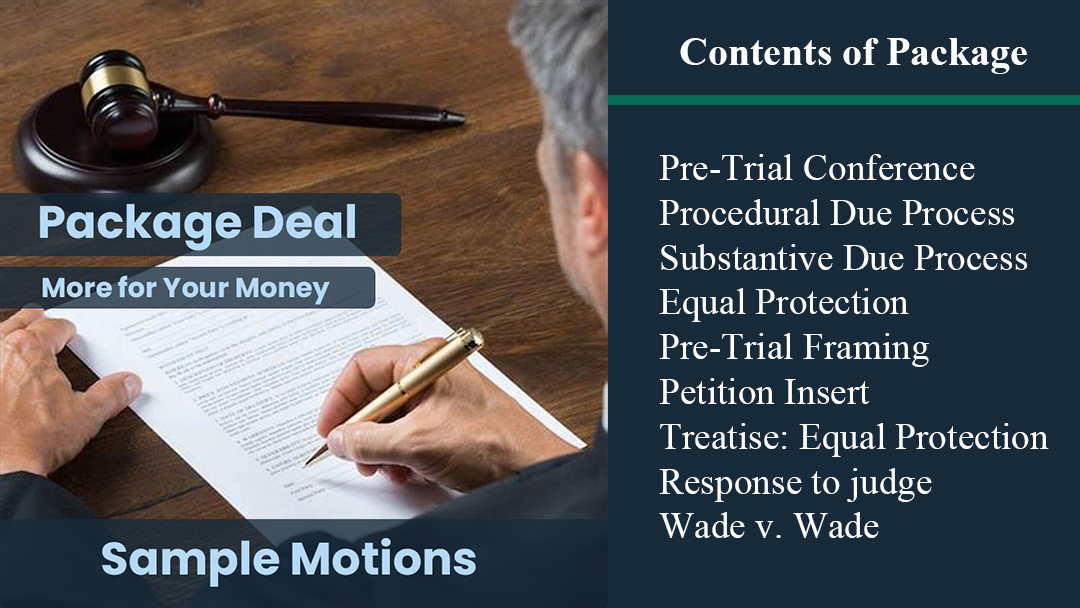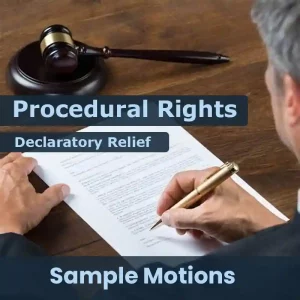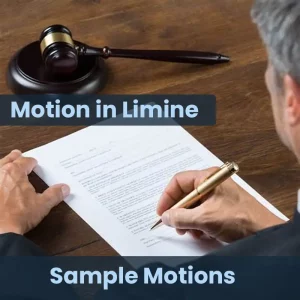Motions Package 1
This is the most comprehensive package available today for you to protect your equal rights. These sample motions assert your fundamental rights in family court. This package saves you time and money. Now you and your attorney can spend your time working the specific facts of your case into the constitutional arguments. As a bonus, you don’t have to pay your attorney thousands of dollars to craft the constitutional arguments. Most of them screw it up when they try anyway. These motions keep them on track.
Use these motions to take back control of your life. Use these motions to save you thousands of dollars. The content in these motions re-frame and re-set the wrong presumptions that your court is making. These motions will guide your attorney, and help your attorney reset their own presumptions. There is advanced training available to assist your attorney with arguing that you have the right to be free from the family court abusive process. Get the motions and get access to the training.
This comprehensive package costs less than the $400 or more that seasoned attorney’s charge for an hour of their time. Recreating each individual motion in this package would require dozens of hours of your attorney’s time, after they have done the many hundreds of hours of research necessary to formulate the arguments. You get much better results and much more for you money by providing these motions to your attorney as a starting point. Who wouldn’t want to have such a massive head start on their case?
More Information
GET THE PACKAGE DEAL AND $AVE
This is the most comprehensive package available today for you to protect your equal rights. These sample motions assert your fundamental rights in family court. This package saves you time and money. Now you and your attorney can spend your time working the specific facts of your case into the constitutional arguments. As a bonus, you don't have to pay your attorney thousands of dollars to craft the constitutional arguments. Most of them screw it up when they try anyway. These motions keep them on track.
Use these motions to take back control of your life. Use these motions to save you thousands of dollars. The content in these motions re-frame and re-set the wrong presumptions that your court is making. These motions will guide your attorney, and help your attorney reset their own presumptions. There is advanced training available to assist your attorney with arguing that you have the right to be free from the family court abusive process. Get the motions and get access to the training.
This comprehensive package costs less than the $400 or more that seasoned attorney's charge for an hour of their time. Recreating each individual motion in this package would require dozens of hours of your attorney's time, after they have done the many hundreds of hours of research necessary to formulate the arguments. You get much better results and much more for you money by providing these motions to your attorney as a starting point. Who wouldn't want to have such a massive head start on their case?
IN THIS PACKAGE YOU WILL RECEIVE...
Pre-Trial Conference Motion - Questions of Law:
In other civil suits there is generally a pre-trial conference where the parties identify those areas of agreement and those areas of disagreement on questions of fact, questions of law, admissibility of evidence, and other issues that help optimize the court’s time during trial and your ability to prepare for trial. Courts impermissibly discriminate against litigants in this class of suit by depriving them of this vital tool.
Declaratory Relief Motions vs Consolidated Motion:
We provide two different examples of how to make these arguments. The first example addresses each type of argument in its own declaratory motion, focusing your attention and the courts attention on only one type of argument at a time. This makes the arguments easier to follow but is a bit wordy. The second example consolidates the three arguments into a single motion interweaving the arguments with each other as they are supposed to apply to protect your rights.
You would file either the declaratory motions or the pre-trial framing motion as appropriate for your case, but you should not file both. Pick the style that best suits your needs and apply that style but read up on both styles because it’s important to be able to respond from both perspectives.
Procedural Due Process Protections, Motion for Declaratory Relief:
You are entitled to fundamentally fair proceedings. Where fundamental rights are at issue, the court is required to do certain things in the record and if it doesn’t then the court violates fundamental fairness. There is one thing you need to do to ensure that this duty of the court is invoked properly and it’s in our motions
Substantive Due Process Protection, Motion for Declaratory Relief:
Our rights come with a set of rules that must be followed before the state can legitimately violate your rights. While your parental rights may not be absolute, the constitutional guarantees protecting your parental rights are absolute. The state simply doesn’t have the power to replace these mandatory guarantees with its viewpoint of your child’s best interests. You need to specifically raise each of these substantive rights with the court and demand that the court apply the applicable guarantees to each right to the standard of constitutional review demanded by each right. If your court fails to provide these guarantees, it fails to establish its authority to infringe on these rights.
Equal Protection Rights, Motion for Declaratory Relief:
Our legal system requires that our laws be applied equally and fairly to all people. Your state fails to provide equal protection and hides that fact with widely accepted false arguments. The fact that your parental rights are “individually” protected rights destroys many of these false arguments if you argue properly. You have a right to receive the same constitutional guarantees that all other civil litigants generally receive, and your child has the right to receive the same parental benefits that other children generally receive. Don’t let them snow you and drag you down their rabbit holes with their fake claims. This motion helps you stop digging the holes deeper.
Consolidated: Pre-Trial Framing Motion
The declaratory relief motions demonstrate how to make these arguments in detail for each type of argument independently. Our consolidated motion, the Pre-Trial Framing Motion demonstrates how these arguments can be combined in a leveraged and more concise manner to make your arguments even more powerful. The individual declaratory relief motions can be filed individually or all together. This motion can be filed instead of those three motions depending on your needs. Most people will use the declaratory relief motions for better understanding but file just the pre-trial framing motion with the court.
Petition Insert:
The original or modified petition frames your case and determines what relief is available or not available to you. If you were served with a petition for child custody, then we highly recommend that you file a counterpetition that reframes the case in your terms. If you haven’t done this, you should speak with us directly about how to do this.
Because the petition frames your case from the start, it is important to get these arguments into that document. You can usually file an amended petition that includes your arguments as core to the arguments of your suit giving you more control over how the law is applied in your case. Our petition insert provides examples of some of the arguments you would want to add in your amended petition.
Treatise: The Equal Rights of Parents:
The Equal Protection Treatise is a paper by Ron & Sherry Palmer shows in significant detail why parental rights are individual rights and why there can be no discrimination based on marital status even where parents are never married or divorced. This treatise is designed to specifically support the Equal Rights Motion.
Child custody courts are still stuck in Nineteenth Century legal thinking regarding families. They continue to believe that your rights to your child and your child’s rights to you depend upon your marriage to your child’s other parent. These courts simply do NOT want to give up the bastardy laws of the Nineteenth Century and they want to treat your child as a bastard child with lesser protected rights than children whose parents are married to each other.
This paper is formatted and published in a manner that allows you to reference it and attach it to your motions as a way to prove your rights to be individual rights without having to use up so much limited space in your motions. It provides a fully cited history of the Supreme Courts evolving treatment of parental rights as individual rights beginning from the 1970’s when the Court began to overturn the bastardy laws of the Nineteenth Century.
Responses to the Judge
Child custody judges make some of the craziest statements of any judges anywhere; but if you do not know how to respond properly, those crazy statements will control your case. In this paper we provide some examples of these judicial statements and show you ways that you can respond to destroy these crazy judicial statements.
You have to understand, your judge knows that child custody law is corrupt all the way through and is entirely indefensible using valid law. Your judge makes these crazy statements as a way to distract you, the attorneys, and the public from seeing the corruption.
Our book, Beginner’s Guide to Family Law, provides even more of these crazy judicial statements and provides you the means of exposing the crazy to your benefit.
Wade vs. Wade
This is a copy of an appellate court case where a mother got an order for psych evals overturned on appeal. This case provides you with how this appellate court analyzed the order and what they used to overturn the order. We provide this case in the package to serve as an example of what you would be looking for in your State to get something similar overturned, thrown out, or quashed. It is part of how you protect your privacy rights. If you are facing psych evals and want to quash them, contact us.
BONUS TRAINING
With this package you receive video explanation of how the motions are designed and how they are intended to be used
The video is almost two hours in length and gives you the context needed to put the motions to good use.
EQUAL TIME WITH YOUR CHILD
Are you being denied equal time with your child or being told that you have to prove why you deserve equal time?
These motions show you how to argue that you are equal to the other parent.
CHARGED WITH CHILD SUPPORT
Are you being told that you are going to have to pay child support but want to argue that you support your child directly?
Your parental authority and the control over your financial future depends on proper due process and protection of your fundamental parental rights.
But you don't understand how to ask the court to do this?
The motions on this page will help you with that. The path to parental equality...equal rights and equal time to your child starts right here on this page.
These motions give you argument to protect you and your child from abuse of power.*
Use these motions to prevent or fight gag orders, child support, psych evals, child custody evals, guardian ad litem appointments, forced counseling, discovery, and other restrictive orders and invasions of your privacy.
What good was knowing you had rights if you didn’t know how to use them? Now you can use them quickly and easily with these motions. (Motions can be used in every state.)
The pre-trial conference - questions of law motion is used to ask the questions of law before the court proceeds on the wrong presumptions. The wrong presumptions create the barrier to being heard on the declaratory judgment motions that follow.
All of these motions and the Petition are designed to be used together as a comprehensive way to persuade your court that you have what it takes to get them overturned if they abuse their discretion or their authority and attempt to infringe or burden your rights.
AND IF THAT WASN'T ENOUGH
GET CONTROL
Most parents get overwhelmed when it comes time to present to their attorney or the court that they have equal rights and get told that it will be super expensive to fight the court’s abuse of power, so the Palmers have made it cheap and easy by creating motions that protect your parental equality. The protection of your rights are built right into these motions. (These motions are FOR EVERY STATE in the U.S. The motions are in Word format so that you can type directly into them.)
TRAINING
The motions package comes with two hours of video explanation from the authors on how the motions are designed and how they are to be used.
STOP THE ABUSE
Stop the courts dead in their tracks today by using these motions to protect you and your child from the damaging orders that the court will make if you don’t!
When the judge tells you:
- that your rights don’t apply in family court
- that you don’t know the law
- that your rights don’t apply because the dispute is between two parents and not the state
When the attorney tells you:
- that you only have these rights in termination cases
- “that’s not how things are done”
Now you can fight back with confidence and use these motions to protect yourself from being punished for protesting instead of feeling trapped, forced, and bullied into giving in.*
THESE RIGHTS ARGUMENTS HAVE ALREADY BEEN PROVEN TO WORK…
One appellate court in Wade v. Wade (the case is in the package with the motions) shows that 1st and 4th amendment are protected even when it is between two parents and not a termination proceeding. This case shows:
- that the constitutional principles that we teach absolutely do apply in child custody cases even when it is not a termination case!
that a parent has to be found unfit before the court can invade their privacy. (Yep, this court actually uses the word fit and unfitness! And yep this is a case between two parents with no cps involved!
that the burden is on the party requesting and the party facing accusations and allegations does not have to prove anything. Allegations and accusations are conclusory and do not support the requirements of “good cause.” This comes from 4th amendment protections. Even though this court does not specifically call out 4th amendment, it is where these requirements and protections come from. (Ha so much for statutes placing the burden on the accused parent in this district in Florida! And so much for the court stating that they are ordering for the best interest of the child.) - that the issue has to be one that is “in controversy” so if it was not properly plead, i.e. if the mental health of the parent was not brought into the pleading and evidence was not more than just allegations then it is only conclusory. And conclusory is not sufficient to meet the “due cause” requirements. And this court mentions that their “in controversy” and “good cause” requirements closely mirror the federal requirements.
- that if the parent being accused volunteers their own mental health then it is brought in (exactly why we tell parents not to consent voluntarily and not to give in to the court making demands if the court did not prove properly)
that even after meeting the two prongs to justify the ordering of a psych eval the court also has to prove that the parent is unable to meet the child’s “special needs.” - that challenging these invasive orders can prevail in the appellate courts and the appellate courts issue a quash order. (We have on our website and in our videos that parents should file a protection order/quash order whenever the court orders invasion of their privacy or the other party requests it in the form of discovery. This further supports the quash order approach.)
- that the appellate court ties their case law into the current case they are evaluating and comments that they are dealing with a very similar case. Here is what they said:
- “Here, we have a very similar case. There has been no evidence, other than the Father's conclusory allegations in his Emergency Motion, that any of the Mother's behavior has had, or will have, an adverse effect on the children, or that the Mother cannot meet the needs of the children. To reiterate, the trial court ordered that the children should go home with the Mother for visitation the very same afternoon that it ordered her to undergo a mental evaluation. Thus, the trial court clearly did not think there was "good cause" to believe that the Mother's mental status jeopardized the children's well-being. We agree that the Mother's actions in front of the Illinois courthouse erroneously suggested that she was homeless, but this is insufficient to satisfy the "good cause" prerequisite under rule 1.360.
- 2. We conclude that the pleadings and the admissible evidence presented at the hearing do not demonstrate that the Mother's mental condition is "in controversy" or that "good cause" exists to subject her to a compulsory mental examination, and thus, the trial court's order departs from the essential requirements of law. Accordingly, we grant the petition for writ of certiorari and quash the portions of the order relating to the compulsory psychological examination of the Mother and the Mother's participation in the oldest child's therapy.
- 3. Petition granted; order quashed in part.”
- Wade v. Wade is a 3rd district appellate court in Florida and is not controlling in every state. The principles that they used regarding “good cause” and “in controversy” and the fitness analysis and the things that we mentioned in the bullet points above are universal for every state. You use this case as advisory and can search for cases in your state appellate courts on scholar.google.com.
Now when the courts abuse you and you protest and they try to punish you for protesting you can protect yourself by following these 5 simple easy steps:
Get the motions.
- Customize the motions to your case.
- Use the motions as you see fit in your case.
- Argue the motions orally in a hearing to get the declarations and your rights established and protected in your court.
- If your court refuses to respect and protect these rights you will have something with teeth to appeal
- Why didn’t the appellate court in Wade call out the 1st and 4th amendment specifically? The appellate courts do not have time or necessity to connect every dot to every constitutional protection. They make rulings on principles without explaining the detail of where those principles come from. That is our job as scholars and educators here are Fix Family Courts. We help you understand where these principles come from so that you can direct the courts to the appropriate principles and their sources in your pleadings. This is how you frame the discussion and lead the judges down the proper constitutional path.
QUASH DISCOVERY
- You can also use these motions in conjunction with a motion for a protective order against discovery and in conjunction with a motion for a quash order too.
- *Be aware that a judge can still punish you at any time. These motions help you argue to overturn them if you have proven that they should not have applied that consequence or that they did not properly apply the consequence.
ADDITIONAL BENEFITS FROM USING THESE MOTIONS
- Protect from "court-induced parental alienation"™
- Protect from having to qualify to continue to be a parent
- Protect from falling under the control of the courts and your ex
- Protect from an abusive process
- Protect from being driven into bankruptcy from the process itself
- Freedom to live out your dreams
*There are never any guarantees that you will prevail or win in your case.
This package is an aid to training parents about the legal process and constitutional arguments that may be raised in family law courts. It is intended to facilitate a conversation between a parent and their attorney regarding the best way to protect the parent's constitutional rights and to aid the attorney in moving the court to protect constitutional parental rights.
While this package is written to comply with Texas rules as understood by its authors it does NOT contain any final legal documents and the documents it does contain may need alteration to meet the rules of motions and pleadings in your state.
NOT A SUBSTITUTE FOR AN ATTORNEY





